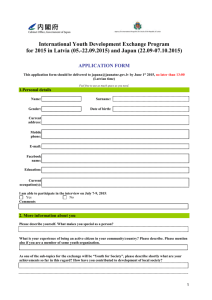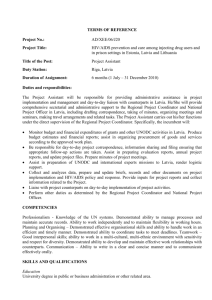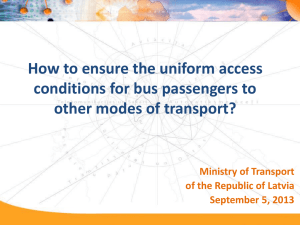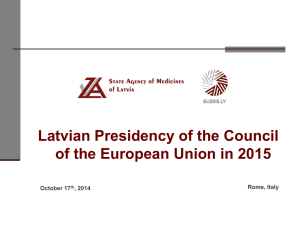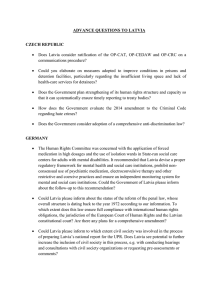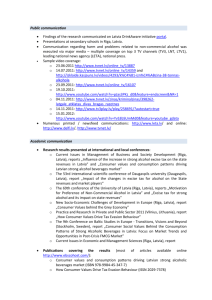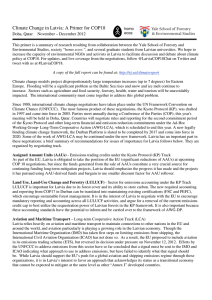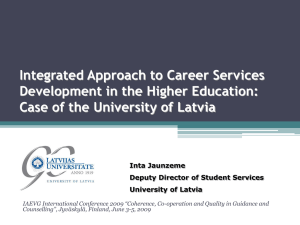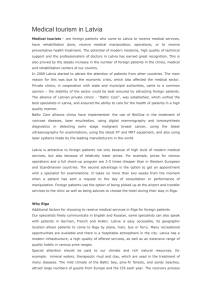University of Latvia Human Resources Policy
advertisement
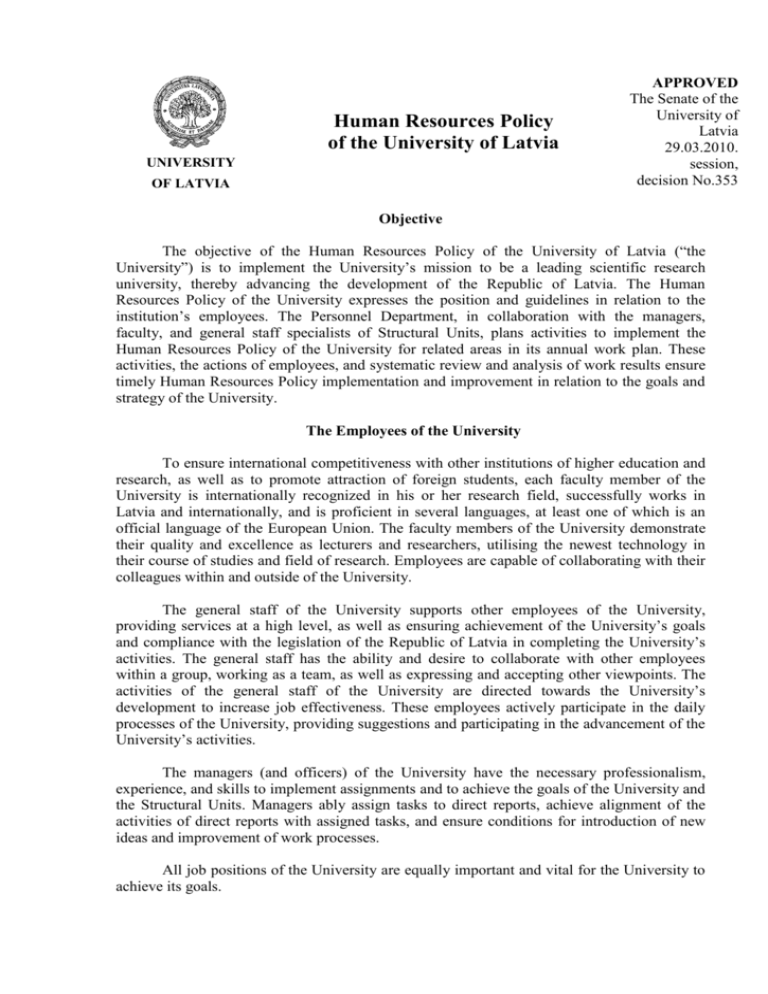
Human Resources Policy of the University of Latvia UNIVERSITY OF LATVIA APPROVED The Senate of the University of Latvia 29.03.2010. session, decision No.353 Objective The objective of the Human Resources Policy of the University of Latvia (“the University”) is to implement the University’s mission to be a leading scientific research university, thereby advancing the development of the Republic of Latvia. The Human Resources Policy of the University expresses the position and guidelines in relation to the institution’s employees. The Personnel Department, in collaboration with the managers, faculty, and general staff specialists of Structural Units, plans activities to implement the Human Resources Policy of the University for related areas in its annual work plan. These activities, the actions of employees, and systematic review and analysis of work results ensure timely Human Resources Policy implementation and improvement in relation to the goals and strategy of the University. The Employees of the University To ensure international competitiveness with other institutions of higher education and research, as well as to promote attraction of foreign students, each faculty member of the University is internationally recognized in his or her research field, successfully works in Latvia and internationally, and is proficient in several languages, at least one of which is an official language of the European Union. The faculty members of the University demonstrate their quality and excellence as lecturers and researchers, utilising the newest technology in their course of studies and field of research. Employees are capable of collaborating with their colleagues within and outside of the University. The general staff of the University supports other employees of the University, providing services at a high level, as well as ensuring achievement of the University’s goals and compliance with the legislation of the Republic of Latvia in completing the University’s activities. The general staff has the ability and desire to collaborate with other employees within a group, working as a team, as well as expressing and accepting other viewpoints. The activities of the general staff of the University are directed towards the University’s development to increase job effectiveness. These employees actively participate in the daily processes of the University, providing suggestions and participating in the advancement of the University’s activities. The managers (and officers) of the University have the necessary professionalism, experience, and skills to implement assignments and to achieve the goals of the University and the Structural Units. Managers ably assign tasks to direct reports, achieve alignment of the activities of direct reports with assigned tasks, and ensure conditions for introduction of new ideas and improvement of work processes. All job positions of the University are equally important and vital for the University to achieve its goals. 2 Human Resources Planning and Recruitment To ensure progression toward a research university, the goal of the University’s human resources planning and recruitment is to attract intelligent, competent, and loyal employees, who are capable of working in the mutual interest of the University to implement functional and strategic effectiveness. Human resources are planned in alignment with the University’s academic and other functional necessities. The University has a unified job catalogue, and the necessary duties and competencies to fulfil the requirements of the job are stated in job descriptions or work assignments. As functions or assignments change, job descriptions are revised. To ensure that the University has high-level specialists that are experienced and recognized in their profession, employees are recruited by organizing employment competitions, in which the qualifications of applicants are evaluated in relation to the legislation of the Republic of Latvia and the University’s requirements for the job position. In special cases, highly qualified employees are attracted without organizing an employment competition. The recruitment process is open and fair, providing equal opportunity for all applicants. The recruitment of candidates is conducted according to the procedure set by the University. The University takes care to ensure retention of its best employees, supporting application of their knowledge and professional experience for their own development and that of the University. The University offers horizontal and vertical career growth, fostering employees’ participation in employment competitions for open job positions. Initiation of New Employees Employees new to the University have a probationary period, during which the employee’s manager acquaints the employee with his or her job duties, provides information that is necessary to fulfil these duties, and provides support throughout the entire initiation period. The employee has the opportunity to acquaint himself or herself with the University and the functions of his or her and other Structural Units. At the conclusion of the probationary period, the employee’s mastery of his or her job duties is evaluated and a decision is made in regard to his or her qualifications to fill the job position. The manager, in collaboration with the Personnel Department, is responsible for the employee’s initiation into his or her job position. Employee Motivation The objective of the motivation system of the University is to further employees’ desire to completely and continually apply their creative potential and knowledge to implement the functions and meet the goals of the University. In defining employee motivational principles, the University takes into account the actual labour market situation. The University has set uniform salary ranges and compensation principles. Employees who work effectively and qualitatively receive pay based on performance, training, and the opportunity to build their professional career at the University. In order to gather information regarding employees’ wants and to improve the employee motivational system, the University conducts employee satisfaction surveys every two years. Performance Management The goal of employee performance management is to ensure evaluation and documentation of employees’ competencies and job results, in addition to creating a feedback 3 loop between employees and their managers. The University measures employee fit with their job positions and their ability to complete job duties. Evaluation is mostly based on quantitative indicators. The employee and his or her manager jointly analyse the employee’s knowledge, skills, and abilities and performance during the review period, determine assignments for the next period, as well as plan the employee’s future development and necessary improvement of professional skills. Performance management results are documented and used for salary decisions and for development of a training plan, as well as for employee career planning. Performance management and development planning is the joint responsibility of the employee and his or her manager. Human Resources Development The goal of human resources development is to advance each employee’s professional development, tailoring and effectively managing the human resources capital of the University. Human resources development includes employee professional development, career planning and implementation, in addition to manager development and succession. To ensure progression toward a research university, the priority of the University is to support the career growth and development of those employees who, regardless of specialization, facilitate the University’s mission and goal achievement through their work. The University implements professional training based on planned, systematic, goaloriented, collaborative, and defined needs from the performance management process. The Personnel Department, in collaboration with managers of Structural Units, summarizes the training needs of the University’s employees, develops a training plan, and ensures that employees receive information regarding training programmes, coordinates the training process, and ensures the corporate training function. The University fosters and supports integration of training with fulfilment of employees’ duties. It is the responsibility of each employee to independently raise his or her professional expertise, evaluate training attended, and effectively apply knowledge and skills thus acquired on the job, ensuring appropriate utilisation of the University’s financial resources for training. The Human Resources policy of the University is implemented through procedures set by the regulations of the University.



